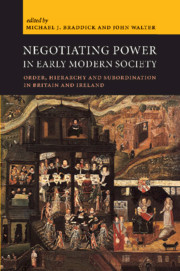Book contents
- Frontmatter
- Contents
- Notes on contributors
- Acknowledgements
- List of abbreviations and conventions
- Introduction. Grids of power: order, hierarchy and subordination in early modern society
- 1 Ordering the body: illegitimacy and female authority in seventeenth-century England
- 2 Child sexual abuse in early modern England
- 3 Sex, social relations and the law in seventeenth- and eighteenth-century London
- 4 Exhortation and entitlement: negotiating inequality in English rural communities, 1550–1650
- 5 Public transcripts, popular agency and the politics of subsistence in early modern England
- 6 ‘Bragging and daring words’: honour, property and the symbolism of the hunt in Stowe, 1590–1642
- 7 Administrative performance: the representation of political authority in early modern England
- 8 Negotiating order in early seventeenth-century Ireland
- 9 Order, orthodoxy and resistance: the ambiguous legacy of English puritanism or just how moderate was Stephen Denison?
- 10 Making orthodoxy in late Restoration England: the trials of Edmund Hickeringill, 1662–1710
- Notes
- Index
9 - Order, orthodoxy and resistance: the ambiguous legacy of English puritanism or just how moderate was Stephen Denison?
Published online by Cambridge University Press: 13 March 2010
- Frontmatter
- Contents
- Notes on contributors
- Acknowledgements
- List of abbreviations and conventions
- Introduction. Grids of power: order, hierarchy and subordination in early modern society
- 1 Ordering the body: illegitimacy and female authority in seventeenth-century England
- 2 Child sexual abuse in early modern England
- 3 Sex, social relations and the law in seventeenth- and eighteenth-century London
- 4 Exhortation and entitlement: negotiating inequality in English rural communities, 1550–1650
- 5 Public transcripts, popular agency and the politics of subsistence in early modern England
- 6 ‘Bragging and daring words’: honour, property and the symbolism of the hunt in Stowe, 1590–1642
- 7 Administrative performance: the representation of political authority in early modern England
- 8 Negotiating order in early seventeenth-century Ireland
- 9 Order, orthodoxy and resistance: the ambiguous legacy of English puritanism or just how moderate was Stephen Denison?
- 10 Making orthodoxy in late Restoration England: the trials of Edmund Hickeringill, 1662–1710
- Notes
- Index
Summary
Over the last thirty or so years the ideological valence of English puritanism, particularly under the early Stuarts, has been subject to a number of wildly divergent and mutually exclusive interpretations. Once characterised by Michael Walzer and Christopher Hill as inherently anti-hierarchical, corrosive of the ideological assumptions and structures of a fading ‘feudal’ order, it was seen as a precursor of modern revolutionary movements or the means to impose the discipline of an emergent capitalism. More recently, it has been characterised, by historians wary of anachronism, as the cutting edge of a consensual religion of protestants embodying beliefs about social order which were, in Patrick Collinson's famous phrase, ‘about as revolutionary as the homily of obedience’. Meanwhile, social historians have emphasised how godliness gave force to a desire for social order around which the interests of the middling sort and their gentry betters could coalesce. It was this social compact, reinforced by the presumptions of puritanism, which ensured the preservation of local social and political orders during the crises of the 1640s. But even this account of the significance of puritanism has been criticised by historians who see these impulses as a species of ‘voluntary religion’, and the measures of social control and discipline as a natural reflex response to population growth and trade crisis which would, according to Professor McIntosh, ‘have happened anyway’.
- Type
- Chapter
- Information
- Negotiating Power in Early Modern SocietyOrder, Hierarchy and Subordination in Britain and Ireland, pp. 206 - 226Publisher: Cambridge University PressPrint publication year: 2001

